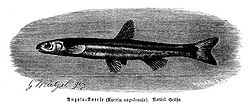| Kneria | |
|---|---|
 | |
| Scientific classification | |
| Domain: | Eukaryota |
| Kingdom: | Animalia |
| Phylum: | Chordata |
| Class: | Actinopterygii |
| Clade: | Anotophysi |
| Order: | Gonorynchiformes |
| Family: | Kneriidae |
| Genus: | Kneria Steindachner, 1866 |
| Type species | |
| Kneria angolensis Steindachner, 1866 [1] | |
| Synonyms [1] | |
Kneria is a genus of small fish in the family Kneriidae. All the species in this genus are restricted to Africa.
Named in honor of Austrian ichthyologist Rudolf Kner (1810-1869) [2]